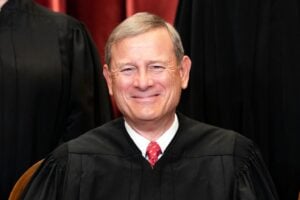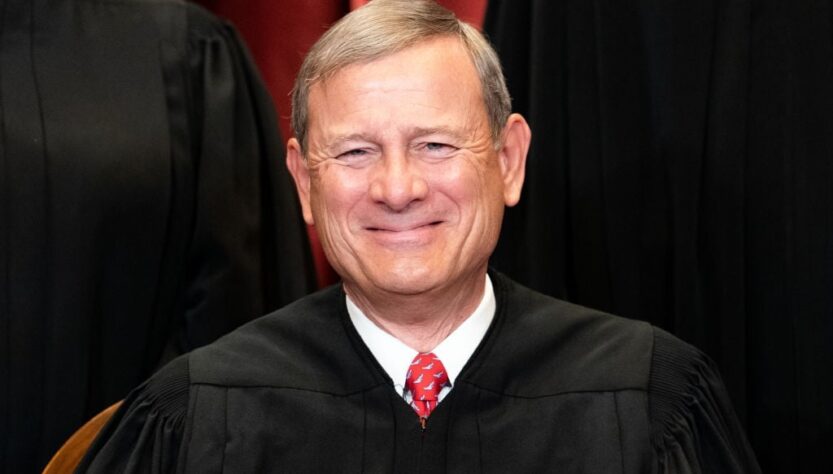 This morning’s oral argument in Trump v. Anderson, the Colorado case ruling Donald Trump ineligible to appear on its ballot by virtue of the Fourteenth Amendment’s insurrection clause, wasn’t particularly surprising. The Supreme Court doesn’t want to be in the business of kicking Donald Trump off of any ballots and this morning’s hearing amounted to an extended jam session for the justices to figure out some coherent reason to dispense with the case.
This morning’s oral argument in Trump v. Anderson, the Colorado case ruling Donald Trump ineligible to appear on its ballot by virtue of the Fourteenth Amendment’s insurrection clause, wasn’t particularly surprising. The Supreme Court doesn’t want to be in the business of kicking Donald Trump off of any ballots and this morning’s hearing amounted to an extended jam session for the justices to figure out some coherent reason to dispense with the case.
And while Trump’s attorney Jonathan Mitchell wasn’t helping the Court — the justices kept jumping in to offer unsolicited advice on the arguments he should be making that he never quite grasped — by the end it seemed the justices came to the conclusion that, whatever the Fourteenth Amendment means, individual states can’t apply the insurrection clause to federal candidates.
Which honestly makes a lot of sense. Certainly a lot more sense than the “what if when the Constitution says the president is an officer it didn’t mean an officer?” argument Trump’s been rolling with.
Should this deep concern over the damage patchwork election laws cause to this country carry over to renewed vigor in invalidating all manner of voter suppression laws? Absolutely. Will it? No. But the idea that the drafters of the Fourteenth Amendment did not envision competing state interpretations of what is and is not an insurrection seemed to achieve a consensus.
Alas, Chief Justice John Roberts took the opportunity to provide the stupidest reason why individual states can’t do this:
I would expect that a goodly number of states will say whoever the Democratic candidate is, you’re off the ballot, and others, for the Republican candidate, you’re off the ballot. It will come down to just a handful of states that are going to decide the presidential election. That’s a pretty daunting consequence.
An election coming “down to just a handful of states,” eh?
Imagine a world where the result of, say, 85 percent of the electoral college is pre-ordained. In a such an unthinkable dystopia, we might take to referring to the remaining 6 states as — and I’m spitballing here — “battleground states” where candidates would focus the overwhelming proportion of campaign resources.
Did this guy hit his head again?
But putting aside this buffoonery, consider the horrifying cynicism at play. Trump sent a mob into the Capitol where they tried to kill his vice president — an action Trump privately described as “the right idea” and that Pence “deserves” it — and that’s arguably not even as insurrectionist-y as leaning on election officials to “find 11,780 votes” or aiding and abetting fake elector schemes. Roberts suggests that if the Court allowed THAT to count as insurrection then there would be no stopping states from announcing partisan disqualifications based on… nothing.
I don’t know. Maybe we could have an institution designed to adjudicate those factual disputes. We could even call it a “judicial system.”
In all seriousness, this is the Chief Justice of the United States suggesting that the rule of law in the country is so fragile that courts would be incapable of distinguishing between a “refusing to send the National Guard to defend against a mob seizing the Capitol” insurrection and a “he tried to make airplanes seat families together” insurrection. What, exactly, is the point of a court but to make calls like that? Whether he fears that courts can’t credibly make those decisions or that courts won’t make those decisions, it’s pretty bad news for the rule of law.
It’s the highest judge in the land confessing to grave and potentially irreversible institutional impotence.
No wonder he spends his annual reports talking about the history of the typewriter.
 Joe Patrice is a senior editor at Above the Law and co-host of Thinking Like A Lawyer. Feel free to email any tips, questions, or comments. Follow him on Twitter if you’re interested in law, politics, and a healthy dose of college sports news. Joe also serves as a Managing Director at RPN Executive Search.
Joe Patrice is a senior editor at Above the Law and co-host of Thinking Like A Lawyer. Feel free to email any tips, questions, or comments. Follow him on Twitter if you’re interested in law, politics, and a healthy dose of college sports news. Joe also serves as a Managing Director at RPN Executive Search.

